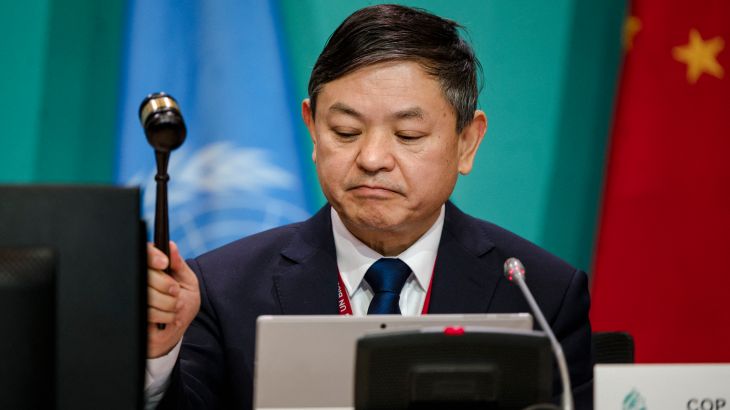Countries seal deal to protect nature despite DRC objection
As part of the agreement, countries committed to protect 30 percent of land and water considered important for biodiversity by 2030.

Countries have reached a landmark agreement at a marathon United Nations biodiversity summit to protect the world’s land and oceans and provide critical financing to save biodiversity in the developing world despite objections from some African countries.
The chair of the COP15 nature summit, Chinese Environment Minister Huang Runqiu, declared the deal adopted at a plenary session in Montreal on Monday and struck his gavel, sparking loud applause from assembled delegates.
Keep reading
list of 4 itemsCritics lament exclusion of Afghanistan from COP27
Do COP gatherings serve any purpose?
COP27: Africa took climate action into own hands, Asia must too
The most significant part of the deal is a commitment to protect 30 percent of land and water considered important for biodiversity by 2030. Currently, 17 percent of terrestrial and 10 percent of marine areas are protected.
“There has never been a conservation goal globally at this scale,” Brian O’Donnell, director of the conservation group Campaign for Nature, told reporters. “This puts us within a chance of safeguarding biodiversity from collapse… We’re now within the range that scientists think can make a marked difference in biodiversity.”
A representative from the Democratic Republic of the Congo (DRC) earlier objected to the text, raising concerns about developed nations’ responsibility for funding conservation in developing countries.
“The parties which are developed nations should provide resources to parties which are developing,” the DRC’s representative said through a translator.
A representative from Cameroon said via a translator: “What we saw was a force of hand.”
🚨#BreakingNews: Nations Adopt 4 Goals, 23 Targets for 2030 In Landmark UN Biodiversity Agreement
By 2030: Protect 30% of 🌏's lands, 🌊, coastal areas, inland waters; Cut food waste in half’; More
📄➡️ https://t.co/wzlD2ivPKD#COP15 #COP15Announcement #GBFAdoption #post2020🌱 pic.twitter.com/d4gQgJ4zIk
— UN Biodiversity (@UNBiodiversity) December 19, 2022
The draft also calls for raising $200bn by 2030 for biodiversity from a range of sources and working to phase out or reform subsidies that could provide another $500bn for nature.
As part of the financing package, the framework calls for increasing to at least $20bn annually by 2025 the money that goes to poor countries — or about double what is currently provided. That number would increase to $30bn each year by 2030.
‘A mixed bag’
Some advocates wanted tougher language around subsidies that make food and fuel so cheap in many parts of the world. The document only calls for identifying subsidies by 2025 that can be reformed or phased out, and working to reduce them by 2030.
“The new text is a mixed bag,” Andrew Deutz, director of global policy, institutions and conservation finance for The Nature Conservancy, said.
“It contains some strong signals on finance and biodiversity but it fails to advance beyond the targets of 10 years ago in terms of addressing drivers of biodiversity loss in productive sectors like agriculture, fisheries, and infrastructure and thus still risks being fully transformational.”
The ministers and government officials from about 190 countries have mostly agreed that protecting biodiversity has to be a priority, with many comparing those efforts to climate talks that wrapped up last month in Egypt.
Climate change coupled with habitat loss, pollution and development have hammered the world’s biodiversity, with one estimate in 2019 warning one million plant and animal species face extinction within decades — a rate of loss 1,000 times greater than expected.
Humans use about 50,000 wild species routinely, and one out of five people of the world’s eight billion population depend on those species for food and income, the report said.
But officials struggled for nearly two weeks to agree on what that protection looks like and who will pay for it.
‘A balance of unhappiness’
Financing has been among the most contentious issues, with delegates from 70 African, South American and Asian countries walking out of negotiations on Wednesday. They returned several hours later.
Brazil, speaking for developing countries during the week, said in a statement a new funding mechanism dedicated to biodiversity should be established, and developed countries must provide $100bn annually in financial grants to emerging economies until 2030.
“All the elements are in there for a balance of unhappiness, which is the secret to achieving agreement in UN bodies,” said Pierre du Plessis, a negotiator from Namibia who is helping coordinate the African group.
“Everyone got a bit of what they wanted, not necessarily everything they wanted. Let’s see if there is a spirit of unity.”